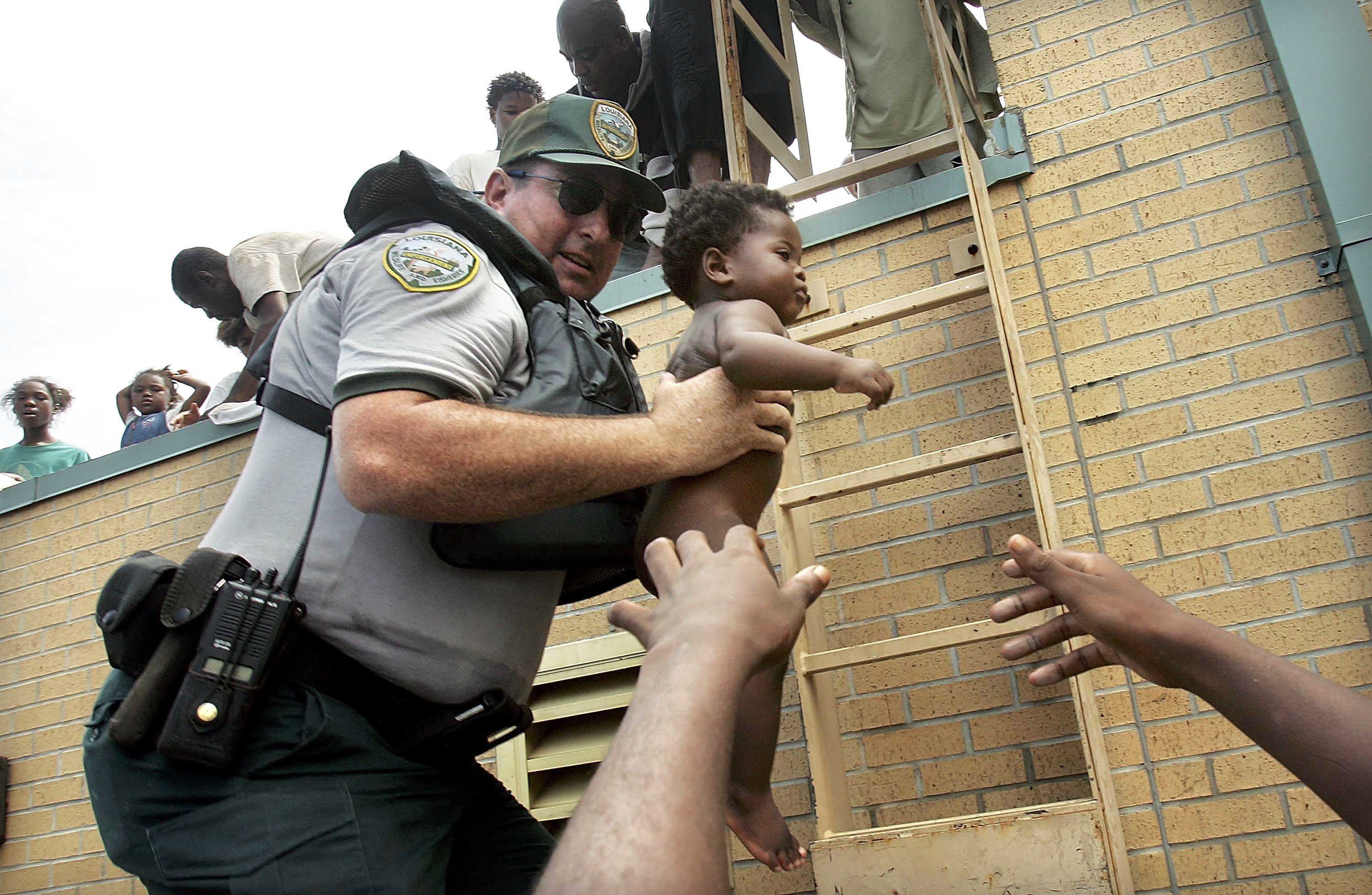Twenty years ago, Guy Riordan was sitting at his farm in New Mexico watching news broadcasts of the crisis unfolding in New Orleans. Hurricane Katrina had made landfall on August 29, 2005, and the resulting flooding and destruction would go on to claim more than 1,300 lives and cause more than $108 billion in damages (in 2005 dollars). Even with first responders and government agencies responding to the fallout, it was clear to Riordan that civilians were needed, too.
“I just got motivated,” says Riordan, then 55 and the chairman of the New Mexico Game and Fish Commission. “I saw people standing on roofs and nobody helping them. There was no one there yet.”
So Riordan called his buddy Steve Padilla (“one of the most unselfish individuals I’ve ever known”) and asked what he was doing for the next few days. The two men loaded Riordan’s duck boat — outfitted with a Gator-style motor suited for shallow waters — and hit the road. At a Walmart, they loaded up on water, granola bars, lanterns, and bug dope. When they reached a blockade outside New Orleans, law enforcement let Riordan and Padilla through into the Lakeview area because of his affiliation with New Mexico Game and Fish.
“It was basically a deserted city. When we first pulled in from an off-ramp from Highway 10, there were federal police standing behind a car, we got out and all of a sudden shots were fired at us. The police hunkered down and so did we.” Riordan still isn’t sure what to make of those shots, though no bullets struck his truck or boat. “There were a lot of shots, and we weren’t sure where they were coming from. I’m not sure if they were residents shooting at us. You just can’t tell what goes on in people’s minds anymore.”
Undeterred, Riordan and Padilla launched in the Lakeview area.
“We entered the water and it was — I hate to use this word but it was — surreal. The water was up within 6 to 8 inches of the street signs. We started looking to see if anybody needed help.”

The floodwaters ran black and putrid, strewn with garbage and bubbling with gas from broken lines. The bugs were constant. Once, Riordan passed a cemetery carpeted with floating plastic flowers. Something huge — an alligator, he suspects — startled at their approach and fled, bouquets rippling in its wake.
Downed electrical lines frightened Riordan the most; the two men were sitting in a metal boat. Padilla removed one of his rubber gloves and kept a hand on the gunnel to remain vigilant for the slightest tingle of electricity. Chain-link fences kept catching their motor until they learned to stay above the flooded streets as best they could, where the motor instead bumped submerged vehicles. Riordan wondered how many people were below them, trapped and drowned inside their cars.
“We didn’t find anybody alive,” says Riordian of that first morning. “We saw lots of dead people. We saw abandoned pets. They were out on a porch of the second story, and we would throw them granola bars, whatever we had. They were frantic, just barking, barking, barking. You could see their fear.”
In those first few days after the storm, their priority was not recovering stray dogs or the dead, but trying to aid any people who were still alive. At times, the two men were alone on the water. Other times, they would see other volunteer boats like theirs: civilian rescuers searching the flooded city, trying to help where they could. Most people, he remembers, refused to leave. They typically accepted water, food, and bug spray, but didn’t want to be evacuated. One friendly man, named Mark, stands out in Riordan’s memory for that reason.
“I had a hard time understanding him because of his rich Creole accent. I don’t know if he ever found his family. He was looking for his wife and two kids.”



After their first day trolling the floodwaters, Riordan and Padilla stopped for gas. A local, who recognized them as civilian volunteers, refused to let them sleep in their truck. Instead, he insisted they return to his home, where he and his wife put them up and fed them hot meals. Riordan can’t remember their names.
“I’ll never forget,” Riordan says of these countless displays of kindness across the region those few days. Despite being shot at and seeing two men who appeared to be robbing a bank, he mostly recalls how selfless everyone was. Even today, it gives him a feeling of hope — of Americans coming together to assist their fellow Americans. “I saw the humanity where people were trying to help other people, and disregarded race.”
Eventually, Riordan started seeing the National Guard and other official responders in the areas he was searching.







“We were giving people food and water. A National Guardsman came up to me, he was a captain, and he said, ‘Sir I would appreciate it if you wouldn’t feed people. We’re trying to get them out of here,’” Riordan was polite but firm. “I said, ‘You’re the ones with the guns. You have the authority. If you want to move them, move them. But I’m not going to sit here and not give somebody assistance if they need assistance.’”
Riordan, who served in the Marine Corps as a helicopter crew chief, was particularly impressed by the Coast Guard’s chopper-led rooftop rescues that he witnessed. More official responders arrived on the scene, and after several days doing what they could in the flooded city, Riordan and Padilla returned to New Mexico. Padilla has since passed away. Riordan hasn’t talked about his experience in Katrina before today, on the 20th anniversary of the storm.
“I think when it all comes down to what you’ve done in life, you want to say, ‘Did I contribute? Did I do a good job? Did I live a good life?’” says Riordan, now 75. “It was an experience I’ll never forget. I’m happy I was able to go there and I hope I relieved some people’s anxieties and made life a little easier for them. But the heroes are the heroes themselves. Those are the people who got through it, helping their own families. I can’t imagine how many people lost their kids or their parents.”




Read the full article here



